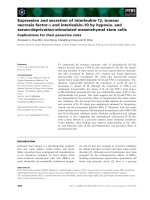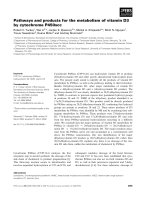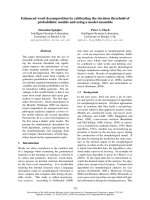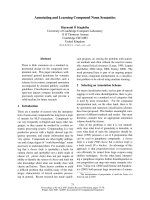Báo cáo khoa học: "Learning and Translating by Machines" ppt
Bạn đang xem bản rút gọn của tài liệu. Xem và tải ngay bản đầy đủ của tài liệu tại đây (96.16 KB, 3 trang )
[
Mechanical Translation
, Vol.7, no.2, August 1963]
Learning and Translating by Machines
by John F. Tinker, Research Laboratories, Eastman Kodak Company, Rochester, New York
To translate well, a machine must be furnished with rules that relate
meaning to words. These rules may be expressed in terms of probabilities,
if they cannot be expressed precisely. Less useful are descriptive rules,
particularly those using concepts of psychology. That these rules can be
satisfactorily formulated is strongly suggested by the fact that a child of
four can adequately manipulate language.
To learn, a machine must be furnished with rules, besides those for
performance, for critically evaluating its performance, and for modifying
the performance rules. Learning is the process of successfully modifying
the performance.
Creativity in humans is an example of this learning process. A human
cannot perform better than his teacher if his rules of critical evaluation
are identical with his teacher’s. If he is to perform creatively, he must
be able to modify all three elements of learning—performance, critique,
improvement rules—not merely the first element. To teach a student to
be creative, the teacher must specify the rules heuristically, not pre-
cisely. This is the same problem as programming a machine to learn.
That the former can be done suggests that the latter is possible.
A good guide to the maximum amount to bet is the
product of the probability of winning and the amount
won. Spending on research is similar to wagering, and
a sensible maximum to a research budget is the prod-
uct of the probability of successful outcome during the
budget time and the expected profit. If the probability
of outcome is zero, the research budget should be zero,
regardless of the profit.
Learning and translating by machine, it has been
suggested, are fields in which the probability of suc-
cessful outcome is zero. But is this so?
A computer can do anything that you can explain,
carefully and patiently, to a child of four. A child of
four can talk. This fact suggests that a machine can
handle language.
Most machines existing today perform simple
manipulations following precise, simple rules. More
complicated rules can be followed, provided they are
precisely expressed. For instance, the ability to follow
different sets of steps, depending on the value of a
particular number, is one possessed by a number of
computers. Programs making use of random numbers
are known. Rules stated in terms of probabilities, or
heuristically stated, are satisfactory provided the state-
ment is precise.
Translation by machine can be accomplished if the
rules of language can be stated precisely. The rules of
grammar and meaning have not been so stated, partly
because of their complexity, and partly because de-
scriptive rules are adequate for teaching language.
Rules of grammar exist and have been stated pre-
cisely enough for computer use in many instances.
Rules of meaning pose more difficulties. Meaning is that
attribute of a word which, by common agreement, refers
to a defined concept. The agreement is reached by
communicating in language. Definition results by com-
parison with related words. Can the meaning of words
be specified by precise rules? Do these rules exist?
A child of four can construct grammatical sentences
expressing an idea. He can extract meaning from sen-
tences, and construct sentences from meaning. The
rules he uses to do this have been given him in a de-
scriptive fashion, and have been refined by trial and
error. He cannot express the rules precisely, yet his use
of them shows that he understands them precisely.
The child applies these rules to spoken language
and, when he is older, to written language. Spoken and
written language are not identical, but they stand in
the same relation as do music and musical notation. In
each case, the notation is adequate to determine many
aspects of a performance but leaves the performer con-
siderable freedom. All the discussions regarding inter-
pretation, composition, and meaning can be transposed
from music to language with considerable pertinency.
Many terms are defined solely in terms of notation: a
musical note, staccato, or presto are things in the nota-
tional scheme. They have consequences in the music
but no specific counterparts. In the same way, a written
word or sentence has consequence in the spoken
language without necessarily having a specific counter-
part.
A player piano is an example of mechanical trans-
lation to musical performance from musical notation.
The roll of paper, which directs the motion of the keys,
47
has on it most of the signals in the notation and a few
more that have been supplied by a human program-
mer. A roll of paper is pulled across a sensing device
and the notes are played when a hole crosses the
sensor. The pitch is determined by the value of one
coordinate, and the position in time is determined by
the other. The tempo is related to the second coordin-
ate so that, at a steady tempo, one bar of notation
corresponds to a certain distance along the paper.
When ritardando or accelerando appears in the nota-
tion, the programmer changes that distance. Note that
terms “bar,” “ritardando,” and “accelerando” influ-
ence the music without appearing in the performance.
The opera performers sing “Zitto, Zitto” (“softly”) but
not “piano” (softly), although both of these words ap-
pear in the notation. An ordinary player piano cannot
vary its dynamics and is quite unable to play a loud
note and a soft note at once, although this is not often
required. Musical notation and the roll of a player
piano are different repertories of signals designed to
allow performance of music. The player-piano roll is
more machine-oriented. The machine can play because
a human programmer has formulated the rules pre-
cisely. It can play, but it can’t learn.
“Learn” is an example of a concept that is defined
more easily in a descriptive way than in a precise way.
It is easy to rationalize when defining things, and so
build conclusions into definitions. Rationalization of
the opinion that learning is forever beyond machines
is contained in the definition of learning as the trans-
fer of control of a process from the conscious to the
subconscious mind. That definition is a systematic re-
lation between words of the sort that Samuel Johnson
had in mind when he began the first dictionary. It is
more useful for defining the psychological terms than
for defining learning.
How does a student learn to play the piano? He is
presented with, and perceives, three things: ( 1 ) a
description of the process of converting the notation
into a performance: (2) a body of rules by which to
judge his performance; and (3) a series of remedies
for common faults of performances. These three ele-
ments are the necessary and sufficient foundation of
any learned skill: technique, critique, and hints for im-
provement. Once the student perceives the details of
this program, he is able to increase the elegance of
his performance on the piano to the level demanded
by his critical judgment. He is able to begin learn-
ing. Learning is the process of refinement of these three
elements—technique, critique, and improvement pro-
cedures.
Solving of an equation by successive approximation
is an elementary learning process. The student is pre-
sented with the equations, with a criterion of success-
ful solution, with directions for finding a bad solution,
and with a procedure for improving a bad solution. He
begins with a problem, a critique, a beginning, and a
technique for improving. By going through the im-
provement procedure a step at a time, the student
finds better and better solutions, finally reaching one
that lies in the range specified by the critique as good
enough. The success of the answer depends on the
critique. If the solution is required to two significant
figures, a few steps are enough; if a more exact solution
is required, more steps must be taken. In general, re-
finement of the critique lengthens the learning process.
Learning a solution of an algebraic problem by suc-
cessive approximation is elementary because each of
the elements is precisely formulated. This is not true of
learning to play. The equations specify precisely how
the answer is related to the problem, but the musical
instructions specify only incompletely how the per-
formance is related to the notation. The directions for
finding an approximate solution are simple, but the
directions for beginning to play are complicated. The
algebraic critique is exact, but the musical critique is
approximate. Each element in algebra is precisely de-
fined, and each element in music is heuristically de-
fined. Learning to play requires the student to formu-
late and systematize the missing rules. He must learn
not only the elements—technique, critique, and im-
provement—but how to refine those elements.
Refinement of the elements may be done auto-
matically on an elementary level. The more adroit re-
finements that humans accomplish require insight and
may involve creativity.
Creativity, insight, and humor are the more re-
markable of outcomes of an instinct—the instinct to
find semblance. The human mind continually searches
lor similarity and is rewarded by the perception of
similarity. Imitative behavior springs from this vigor-
ous drive: a child imitates those around him to find
similarity between his own actions and those of others.
Cats imitate one another, monkeys mimic men. These
examples are more obvious than the more sophisticated
imitations of more mature people.
As a man matures, his search for similarity is car-
ried to more and more abstract levels. A child imitates
his father’s movements; as he grows older, he begins to
imitate behavior, then to imitate principles of behavior.
Finally, he begins to see similarity among abstract
propositions.
There is a French proverb, “Plus ça change, plus
c’est la même chose.” [“The more things change, the
more they are the same.”] It is a synonym of “There is
nothing new under the sun.” In both proverbs, beneath
the commentary about slowness of change, we can
detect the tendency of the mind to interpret the new
in terms of the old, to seek similarity.
The search for similarity is clearly an advantage for
a species. Often the solutions to yesterday’s problems
can be applied to today’s problems, if they are similar.
The catalogue of resemblances is a help in choosing a
successful course of action with incomplete information.
The search for similarity is unceasing and does not
always yield a useful result. Two things may be in-
48
TINKER
congruous yet have similarity from some point of view.
This condition can be built into a joke; humor depends
on the logical relation of the incongruous.
If the logical relation is novel, it constitutes a crea-
tive insight. In this case, the rules for critical evaluation
are important. An individual, taught a sufficient num-
ber of rules, is likely to assume that there are no more
rules. Then the critique includes a rule that stabilizes
itself, and vetoes any creative insight.
Creativity is the outcome of a sophisticated and
knowledgeable search for similarity. To learn to play
most successfully, the student must be taught in such
a way that his insight and creativity can modify his
critical evaluation of his performance. The critique
must be specified, not precisely, but heuristically.
Teaching for creativity is the same problem as pro-
gramming a computer for learning. In each case, the
directions for judging the success of the task must be
allowed flexibility, and further directions concerning
this flexibility must be given.
A computer and a child show no internal resem-
blance, nor do they follow directions in the same way.
The child’s ability to deduce general rules of behavior
from many examples, some of them inappropriate or
wrong, has encouraged his teachers not to formulate
the rules precisely but to rely on repetition and imita-
tion as the mechanism for absorbing the rules.
The computer cannot absorb rules in this way. But,
in talking, the child makes use of rules, even though
they are not consciously or precisely formulated. The
child makes use of these rules in such a way that, were
the rules precisely formulated, a computer could fol-
low them.
To be able to manipulate the language as success-
fully as he does, a child must have at his subconscious
command a series of rules. How he deduces these
rules, and the mechanics of his use of them, are not
important to our argument. His use of them demon-
strates that they exist. To put them into the form
that a computer can use requires, not that they be in-
vented or discovered, but that they be formulated.
To learn, an entity must have several choices of be-
havior; a means of judging the success of its choice,
and a way of improving its judgment. It is difficult to
design a computer of this sort and harder yet to pro-
gram a present-day computer to behave this way, but
it is possible in principle.
To produce high-quality translations, a computer
must be able to learn to manipulate language and
meaning. When the relations between language and
meaning are specified, no matter in how complicated
a way; when the criteria of high-quality translation
are outlined, with suggestions about how to improve
the criteria; and when the mode of improvement for
each criterion is formulated, a computer can be built
to produce high-quality translations. With technique,
critique, and improvement rules specified heuristically,
machine translation is at hand.
A child of four can do it—why not a machine?
Received November 5, 1962
LEARNING AND TRANSLATING 49









